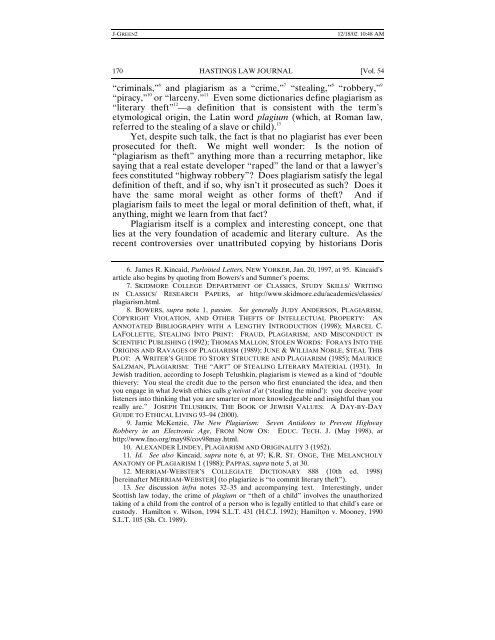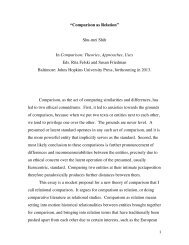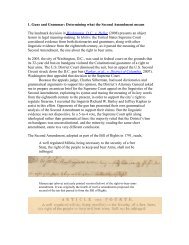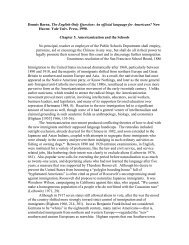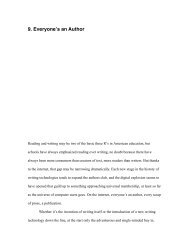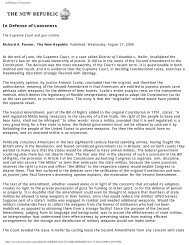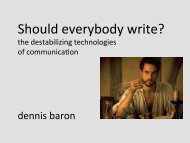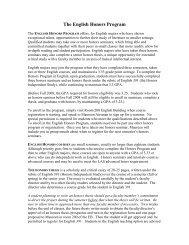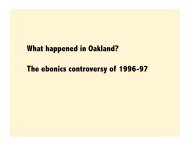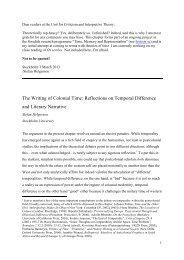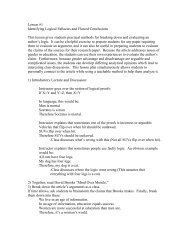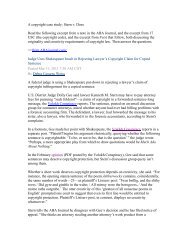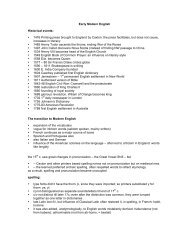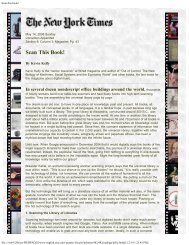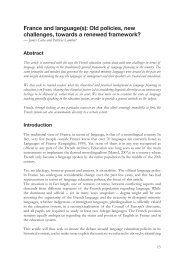Plagiarism, Norms, and the Limits of Theft Law: Some ... - English
Plagiarism, Norms, and the Limits of Theft Law: Some ... - English
Plagiarism, Norms, and the Limits of Theft Law: Some ... - English
You also want an ePaper? Increase the reach of your titles
YUMPU automatically turns print PDFs into web optimized ePapers that Google loves.
J-GREEN2 12/18/02 10:48 AM<br />
170 HASTINGS LAW JOURNAL [Vol. 54<br />
“criminals,” 6 <strong>and</strong> plagiarism as a “crime,” 7 “stealing,” 8 “robbery,” 9<br />
“piracy,” 10 or “larceny.” 11 Even some dictionaries define plagiarism as<br />
“literary <strong>the</strong>ft” 12 —a definition that is consistent with <strong>the</strong> term’s<br />
etymological origin, <strong>the</strong> Latin word plagium (which, at Roman law,<br />
referred to <strong>the</strong> stealing <strong>of</strong> a slave or child). 13<br />
Yet, despite such talk, <strong>the</strong> fact is that no plagiarist has ever been<br />
prosecuted for <strong>the</strong>ft. We might well wonder: Is <strong>the</strong> notion <strong>of</strong><br />
“plagiarism as <strong>the</strong>ft” anything more than a recurring metaphor, like<br />
saying that a real estate developer “raped” <strong>the</strong> l<strong>and</strong> or that a lawyer’s<br />
fees constituted “highway robbery”? Does plagiarism satisfy <strong>the</strong> legal<br />
definition <strong>of</strong> <strong>the</strong>ft, <strong>and</strong> if so, why isn’t it prosecuted as such? Does it<br />
have <strong>the</strong> same moral weight as o<strong>the</strong>r forms <strong>of</strong> <strong>the</strong>ft? And if<br />
plagiarism fails to meet <strong>the</strong> legal or moral definition <strong>of</strong> <strong>the</strong>ft, what, if<br />
anything, might we learn from that fact?<br />
<strong>Plagiarism</strong> itself is a complex <strong>and</strong> interesting concept, one that<br />
lies at <strong>the</strong> very foundation <strong>of</strong> academic <strong>and</strong> literary culture. As <strong>the</strong><br />
recent controversies over unattributed copying by historians Doris<br />
6. James R. Kincaid, Purloined Letters, NEW YORKER, Jan. 20, 1997, at 95. Kincaid’s<br />
article also begins by quoting from Bowers’s <strong>and</strong> Sumner’s poems.<br />
7. SKIDMORE COLLEGE DEPARTMENT OF CLASSICS, STUDY SKILLS/ WRITING<br />
IN CLASSICS/ RESEARCH PAPERS, at http://www.skidmore.edu/academics/classics/<br />
plagiarism.html.<br />
8. BOWERS, supra note 1, passim. See generally JUDY ANDERSON, PLAGIARISM,<br />
COPYRIGHT VIOLATION, AND OTHER THEFTS OF INTELLECTUAL PROPERTY: AN<br />
ANNOTATED BIBLIOGRAPHY WITH A LENGTHY INTRODUCTION (1998); MARCEL C.<br />
LAFOLLETTE, STEALING INTO PRINT: FRAUD, PLAGIARISM, AND MISCONDUCT IN<br />
SCIENTIFIC PUBLISHING (1992); THOMAS MALLON, STOLEN WORDS: FORAYS INTO THE<br />
ORIGINS AND RAVAGES OF PLAGIARISM (1989); JUNE & WILLIAM NOBLE, STEAL THIS<br />
PLOT: A WRITER’S GUIDE TO STORY STRUCTURE AND PLAGIARISM (1985); MAURICE<br />
SALZMAN, PLAGIARISM: THE “ART” OF STEALING LITERARY MATERIAL (1931). In<br />
Jewish tradition, according to Joseph Telushkin, plagiarism is viewed as a kind <strong>of</strong> “double<br />
thievery: You steal <strong>the</strong> credit due to <strong>the</strong> person who first enunciated <strong>the</strong> idea, <strong>and</strong> <strong>the</strong>n<br />
you engage in what Jewish ethics calls g’neivat d’at (‘stealing <strong>the</strong> mind’): you deceive your<br />
listeners into thinking that you are smarter or more knowledgeable <strong>and</strong> insightful than you<br />
really are.” JOSEPH TELUSHKIN, THE BOOK OF JEWISH VALUES: A DAY-BY-DAY<br />
GUIDE TO ETHICAL LIVING 93–94 (2000).<br />
9. Jamie McKenzie, The New <strong>Plagiarism</strong>: Seven Antidotes to Prevent Highway<br />
Robbery in an Electronic Age, FROM NOW ON: EDUC. TECH. J. (May 1998), at<br />
http://www.fno.org/may98/cov98may.html.<br />
10. ALEXANDER LINDEY, PLAGIARISM AND ORIGINALITY 3 (1952).<br />
11. Id. See also Kincaid, supra note 6, at 97; K.R. ST. ONGE, THE MELANCHOLY<br />
ANATOMY OF PLAGIARISM 1 (1988); PAPPAS, supra note 5, at 30.<br />
12. MERRIAM-WEBSTER’S COLLEGIATE DICTIONARY 888 (10th ed. 1998)<br />
[hereinafter MERRIAM-WEBSTER] (to plagiarize is “to commit literary <strong>the</strong>ft”).<br />
13. See discussion infra notes 32–35 <strong>and</strong> accompanying text. Interestingly, under<br />
Scottish law today, <strong>the</strong> crime <strong>of</strong> plagium or “<strong>the</strong>ft <strong>of</strong> a child” involves <strong>the</strong> unauthorized<br />
taking <strong>of</strong> a child from <strong>the</strong> control <strong>of</strong> a person who is legally entitled to that child’s care or<br />
custody. Hamilton v. Wilson, 1994 S.L.T. 431 (H.C.J. 1992); Hamilton v. Mooney, 1990<br />
S.L.T. 105 (Sh. Ct. 1989).


